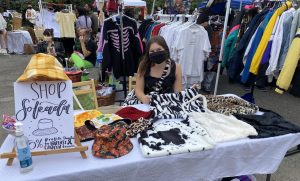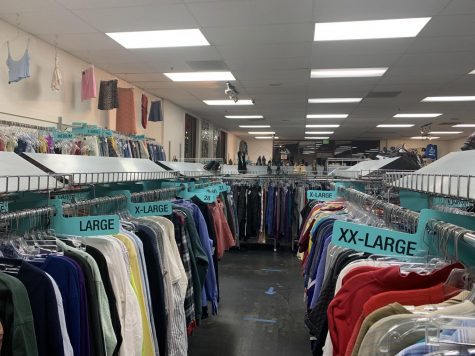Your donation will support the student journalists in the AVJournalism program. Your contribution will allow us to purchase equipment and cover our annual website hosting costs.
Staying Sustainable
Three years ago, when H&M came under fire for their mistreatment of workers and poor labor conditions, Sowers decided she wouldn’t shop there anymore. But after looking more into the issue with her mother, Sowers realized the underlying problem wasn’t just with H&M, but within the inner workings of the fast fashion industry itself.
“[That’s] when I really started to shift my mindset. I think it’s common that people go to these big brands and big companies because they’re what’s convenient, when in reality, your singular impact can definitely have more of a lasting effect than you’d ever think,” said Sowers.
Instead of heading to the mall for new batches of clothes, consider buying from online second-hand dealers like ThredUp or Depop. These platforms emulate the quick browsing experience that comes with online shopping, which makes thrifting just as accessible and easy as buying from fast fashion stores.
In a surprising twist, designer items and fast fashion clothing can often find their way into thrifting communities like ThredUp, which is how Smith ended up bagging a deluxe Coach purse for just $30.
In her eyes, the thrill of thrift shopping lies in the unpredictability of what one will end up purchasing and the greater personal customization one can enjoy.

“It’s more fun to go thrifting because you’re more able to put your own fashion and own sense of style into it, instead of just going along with the [existing] trends and doing what’s new,” said Smith.
The founder of Shop Soleada, an online business that sells handmade bucket hats and tote bags, Smith urges teens to support smaller shops and local thrift stores that are transparent about their clothing policies. These alternatives allow customers to revive unwanted, second-hand garments and reduce the large amount of clothing dumped in landfills.
“By shopping from small brands, you know where your products are coming from, you know it’s good quality, you know you’re not exploiting people from different countries for different resources,” said Smith. “It’s important to actually go to sustainable brands you know are actually coming from good places and are not using environmental reasons to get you to shop there.”
Sowers currently works at a store called Girlfriends Boutique based in downtown Pleasanton. Her experience at Girlfriends opened her eyes to how the fast fashion industry can harm local businesses.
“When you choose to buy from a business that works unsustainably, you’re not only supporting their contribution to the pollution of the environment, but you’re also taking away money that could be what’s helping a local business owner make a living,” said Sower.
What’s even more important than where you shop is how you treat your clothes. Before buying something new, seeing if you can repurpose or alter something you already own is the perfect solution to over-aggressive consumerism.

“I usually wear [my clothes] for a few years… Once they get old, I just wear them at home and I sleep in them. If they tear or rip badly, then I chuck them or donate them if they’re not horribly ripped,” said Anya Srinivasan (‘24).
In addition to extending the life cycle of one’s clothes, thrift flips offer plenty of creative ideas for transforming old clothing into something new and stylish. YouTube creators like Ashley Rous from Bestdressed and Wendy Liu from withwendy used their platforms to teach and promote altering and tailoring one’s old clothes to a better fit.
Ultimately, to become a more conscious consumer, teenagers need to educate themselves more on the problems and issues tied to fast fashion.
“We’re in a pretty cool time in our lives where we’re developing our own identity and sense of self, and [we should be] taking advantage of that to realize that… you don’t need to follow the norm, [and] if everyone shops at that one place it doesn’t mean you need to shop there too,” said Sower. “[Once you] realize what you do has an impact, I think the rest kind of follows.”